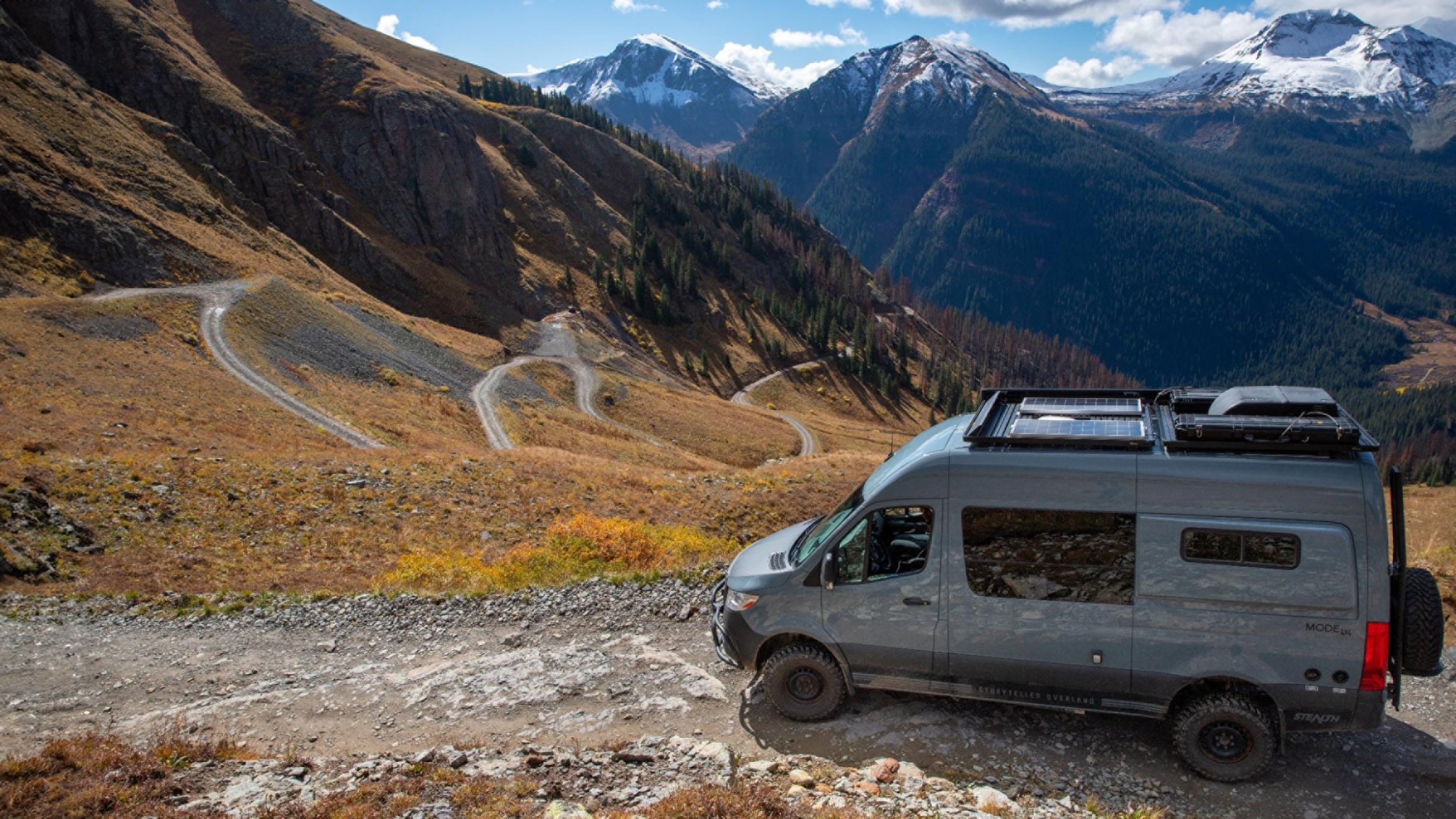Need an icebreaker at a mountain town bar, or a conversation starter around a campfire? Try this: What’s better, a van or a truck camper?
It’s a debate I’ve had with friends many times over the years (and a topic I’m sure my wife Sarah would greatly appreciate never hearing about again). The pro and con list for each can be endless, and “better” can be in the eye of the beholder and depend on how exactly you want to use the vehicle: Which is more comfortable to camp out of? What does better off road? What gets better gas mileage? Which one does better in the snow?
For the sake of keeping this article from turning into a novel, let’s keep the comparisons between stock, four-wheel drive pickups and vans that come with four-wheel or all-wheel drive from the factory (so we’re not talking about anything requiring a 4WD conversion here). And we’ll keep the question to: “Of these two options, which makes the more capable adventure rig?”
Full disclosure: I’m a truck guy. I’ve long thought that a van—even in four-wheel drive guise—could never get me to the places I regularly go in my truck while hunting and recreating around the West.
But a few months ago, I had the opportunity to test a brand new AWD, 144-inch wheelbase Mercedes Sprinter built out with an interior. Truth be told, I was just as stoked to test the van itself as I was the buildout, because I was hoping it might help change my opinion on the truck versus van debate. Spoiler alert: it didn’t.
Aside from being incredibly loud on anything but pavement (due to the cavernous echo chamber that is the inside of any high-roof van), I found it difficult to navigate on rough dirt roads, and unnerving to drive on any remotely off-camber trails, due to its tall height.
I took the van down a road where I’d previously driven a full-size pickup towing a 20-foot Airstream Basecamp, and found that I couldn’t get as far down the road as I had in the truck due to a pretty sketchy, washed-out turn I’d forgotten about. I didn’t give that zone a second thought with the truck (even while towing). Could the Sprinter have made it? Possibly, but I wasn’t willing to risk flopping a very expensive van over on its side.
I’ve driven and ridden in several types of vans on gravel and dirt roads over the years, and have always had a negative experience. They’re loud, tippy, bulky, and in my experience, harsh-riding (with factory-installed suspensions) they’re designed to haul cargo and deliver packages in urban environments, after all. That said, I’ve never actually owned one, so my take on the question of capability isn’t exactly fair.
To help balance my bias, I reached out to a couple of folks who’ve owned both types of vehicles over the years in hopes of getting a more insightful answer on the truck versus van debate.
My good friends and , both longtime �����ԹϺ��� contributors, are hunters, cyclists, climbers and skiers, and have lots of experience camping and living full-time out of adventure rigs. Since 2016, their go-to setup has been a 2016 Chevrolet Silverado 2500HD towing a 2014 Airstream Flying Cloud 23FB. Last Fall, they bought a . Theirs has a Sportsmobile pop-top and a minimalist buildout that lends itself to better off-road performance than you’ll get out of most vans.
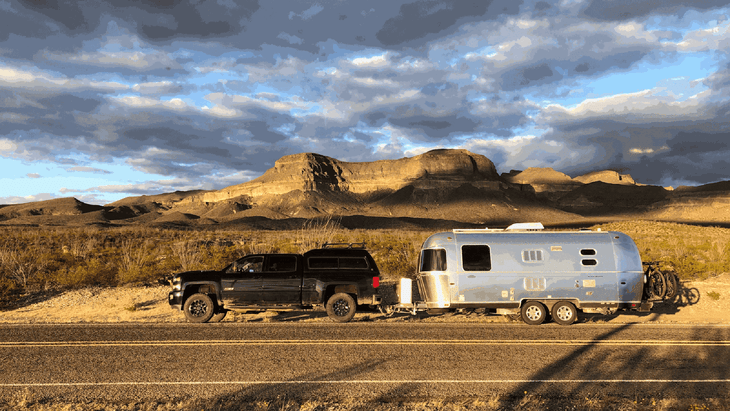
I also touched base with , Trail Guide Manager at onX Off Road and former Editor at , who has more off-road driving experience than just about anyone I know.
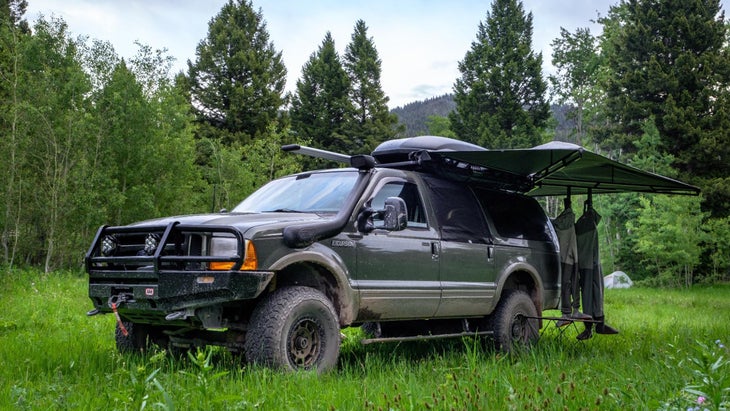
He’s owned a whole host of rigs throughout the years, including a based on the 144WB VS30 4×4 Sprinter, and a 2000 (essentially an F250) with the legendary 7.3L diesel engine, running 37-inch tires and every overland mod you can think of. He’s taken all of his rigs on gnarlier terrain than most vehicles will ever see.
If you are adventure rig shopping and considering a van or truck camper, their insights are well worth the read.
Q&A: Which Is the Better �����ԹϺ��� Vehicle—a Van or a Pickup Truck?
Bryan Rogala: You all have lots of experience with trucks and vans in general, and taking them into some serious spots off road that I doubt most �����ԹϺ��� readers would take either type of vehicle. What’s your overall take on a 4×4 van vs. a truck?
Chris Cordes: Truth be told, it greatly depends on the vehicles you’re comparing. A Syncro VW or 4×4 E-Series is an entirely different animal than a 170 Sprinter, and a Tacoma is a far cry from an F-350. If I were looking only at full-size four-wheel drive vans and trucks built within the last few years, I’d say this: most 4×4 vans built within the last decade were not designed for off-road use.
They were designed as delivery vehicles with enough capability to tackle forest roads, mud, and snow on the way to drop off their parcels. Their articulation, high center of gravity, gearing, and unibody construction limit them when compared to a full-size 4×4 truck. With enough determination and patience you can bring them farther than many people will believe possible, but it will take twice the skill and three times the stress to do so.
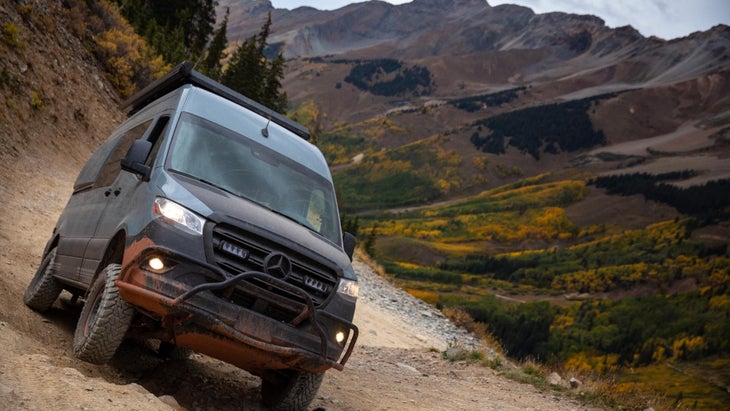
Aaron Gulley: I’ve been pretty impressed with how capable our van is. I will say, I feel a little more hesitant—or reticent—to take it down or up things that I would do with the truck. It feels like the center of gravity is a little higher, and you really notice it when you start getting into off camber stuff. I’m also a little more reluctant to take it onto that type of terrain because it’s a pretty expensive vehicle—not that the truck’s not, but I feel like the truck’s just sort of built for it.
Are there any scenarios that come to mind in which you didn’t drive the van, but you would’ve taken a truck?
AG: We were in the truck this weekend while hunting, and we took a very, very steep and rugged road. I don’t think I would’ve taken the van up or down that. It might have done it, but I would have been far more uncomfortable.
CC: We tried very hard to take the van anywhere we’d take a truck, but found its limits more often than we would have liked. The worst examples were in the mountains where elevation reduced power, and the gearing became inadequate to allow for controlled negotiation of anything even slightly technical. We often had to use momentum to get over obstacles, and a failed attempt could put us in a very precarious situation.
On our last Colorado trip with the van, we made a successful—but white knuckle—ascent to Clear Lake, and a failed attempt at Ophir Pass. We wrote off all mountain passes after that, despite having previously tackled Alpine Loop and Imogene pass in my Excursion and towing a trailer over the same passes.
Talk about the differences in ride height, clearance, etc. Have you found either to perform better in tight spots?
CC: Ride height and clearance will vary greatly depending on the model of van or truck you choose. Ford’s AWD transit, for example, is unacceptably low to the ground in my opinion, but the 4×4 Sprinter has an impressive amount of ground clearance and a respectable approach and departure angle. Compared to some trucks it could actually be an advantage. I never had a problem with the clearance in our van, even when hitting trails like Chicken Corners in Moab [Utah].
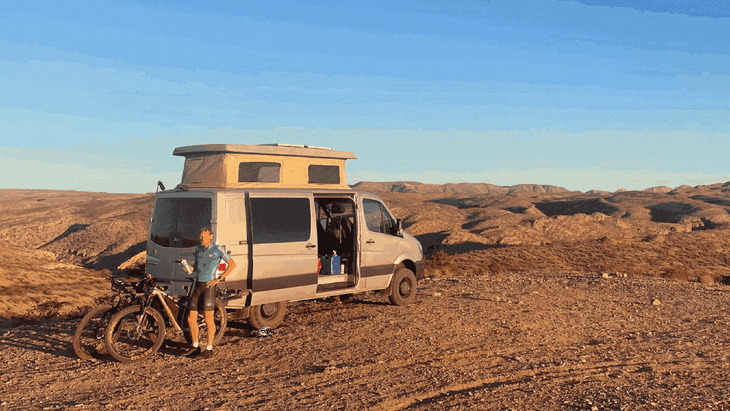
AG: I took some measurements of our van (a 2016 4×4 Sprinter), and truck (a 2016 Chevrolet 2500HD) to see how they compare. The seat height in the van is 51 inches from the ground, and it’s only 41 inches in the truck. There’s 9 inches of clearance to the bottom of the rear differential on both rigs, but the side of the van sits 15 inches off the ground, while the truck’s sheet metal sits 20 inches off the ground.
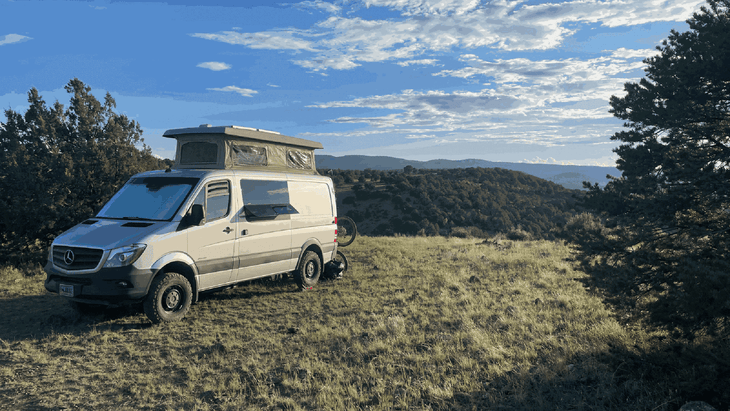
I would actually say the van is better (in tight spots) because it’s narrower. The only annoying thing is that often, because the track width is narrower, you don’t fit quite so well in the big troughs that get dug out on dirt roads. You sort of get punched around from side to side like you’re on a Disneyland ride.
BR: How does the ride on rough terrain compare for, say, a stock three-quarter-ton pickup and a 4×4 Sprinter?
CC: The biggest thing you’re going to notice between the two is how much side-to-side sway a Sprinter or any high roof van has. Because the CG is so high, and the articulation is so limited, uneven terrain can start tossing the van back and forth in a progressively more uncomfortable side-to-side motion until you stop the van or slow to a crawl. This, of course, still happens in a truck, but to a lesser degree unless you’ve got an extremely tall camper in the bed.
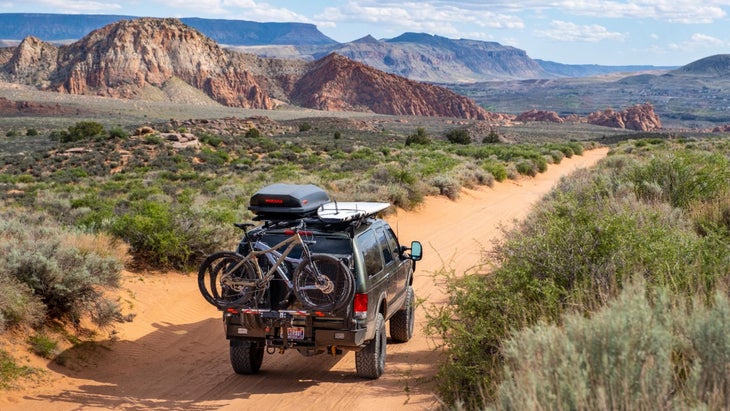
AG: I’m really glad we don’t have a high roof—that would make me really anxious. Here in New Mexico where it’s so windy, it’s really nice having the low one, and we still feel like it’s like a wind magnet—I can’t imagine having the tall one. We never feel like we’re getting pushed around by wind in the truck, but the van feels like that a lot.
Jen Judge: The other thing about the van is there’s not as much storage or space inside, so things are sort of floating freely around more. When we take it up super rough roads, stuff flies around, and it’s super noisy. It’s harder to kind of keep stuff in place in the van, so I feel like things inside get beat up more on rougher roads than in a truck.
Any noticeable differences between the two on snow covered roads?
AG: I’ve taken the van up to the ski hill a couple of times. It’s terrible unless you’re in 4-high, but it seemed fine in 4-high.
JJ: The worst thing is our van doesn’t have a shift-on-the-fly system, so you have to stop and put it in neutral no matter what.
CC: Most of my experience living out of either platform was chasing sunny 75-degree weather, so my snow experience is limited. From the experiences we did have with them in snow, both platforms were capable and predictable.
If you had to pick between a truck with a camper and a van, what would you choose?
CC: Overall, I believe the van is the more spacious and comfortable platform to live in, but if I planned to leave the pavement regularly, I’d want the capability of a 4×4 truck to get me where I need to go and back again. It’s definitely part of the reason we now drive a full-size Dodge.
JJ: I feel like the van actually has the advantage. It’s really close capability-wise for our comfort level driving in the backcountry, but it’s a lot easier to drive around town. I would drive it around town every day, whereas the truck is tough. I feel like if you’re going to have one vehicle, it’s a better choice.
AG: If you’re a person who likes to be outside a lot when you camp and be in the weather, I think a truck is great. If you prefer more comfort, then the van is great. It’s not going to be quite as capable as a truck, but for the majority of people for what they’re doing, I don’t know that most people are going to be so adventurous in their driving that it’s going to make a difference. I do feel like if I’m honest, there’s probably not many scenarios where we would take the truck that we wouldn’t take the van.


